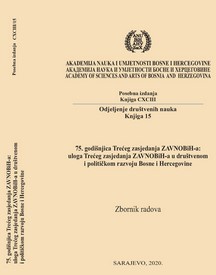NARODNOOSLOBODILAČKI ODBORI U BOSNI I HERCEGOVINI IZMEĐU DRUGOG I TREĆEG ZASJEDANJA ZAVNOBIH-A
THE PEOPLE'S LIBERATION COMMITTEES IN BOSNIA AND HERZEGOVINA BETWEEN THE SECOND AND THIRD SESSIONS OF ZAVNOBIH
Author(s): Elmir Sadiković
Subject(s): Governance, Political history, Government/Political systems, WW II and following years (1940 - 1949), Post-War period (1950 - 1989), Peace and Conflict Studies
Published by: Akademija Nauka i Umjetnosti Bosne i Hercegovine
Keywords: ZAVNOBiH; Bosnia and Herzegovina; national liberation committees; people's power; state power;
Summary/Abstract: Formed in extremely hard war circumstances of combat against occupiers and domestic collaborationists, since their founding, national liberation committees (NOO) were basic instruments concerning organization of armed resistance and civil life in the liberated territories. In the period of 1942-1945, throughout strengthening of national liberation movement (NOP ), organization and legal codification of NLC with decisions of National Anti-Fascist Council of the People’s Liberation of Bosnia and Herzegovina (ZAVNOBiH) and Anti-Fascist Council for the National Liberation of Yugoslavia (AVNOJ), a compact, uniformed, functional and hierarchically organized system of people’s governance is established in Bosnia and Herzegovina. Structure of national liberation committees, from the lowest to the highest ones, was shaped as the comprehensive system of the state governance institutional organization. This was the foundation for the future state organization of Bosnia and Herzegovina. Various geographical, military and economic circumstances have influenced on miscellaneous development dynamics of people’s governance and national liberation committees throughout entire Bosnia and Herzegovina in the period from the second until the third assembly of ZAVNOBiH. In general perspective, in this specific period with hard war circumstances, national liberation committees have improved their inner organization and successfully developed their activities in the areas of economy, education and health. During the war, national liberation committees were recognized as the governance with great support by the people and have become the basic for shaping contemporary local self-governance system in Bosnia and Herzegovina after the war.
- Page Range: 63-81
- Page Count: 19
- Publication Year: 2020
- Language: Bosnian, Croatian, Serbian
- Content File-PDF

